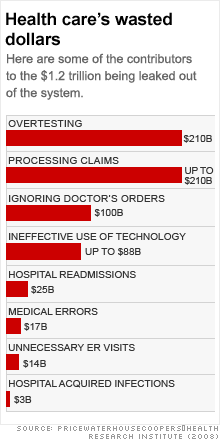Just words..........Unless there is evidence.
Just saw this:
It is a simple fact that it is the uninsured who are driving up the cost of healthcare for everyone.
Here are the facts.
In 2005, there were 44.8 million who had no medical insurance. In 2006, that number had grown to 47 million. Presently, it is estimated that there are 50 million who have no coverage, and that number will rise to over 52 million at the end of 2010.
As a former director of a hospital emergency department seeing over 50,000 patients annually, I am very aware of how the medical system works.
Anytime an uninsured person enters a hospital emergency department and registers in, the minute they cross the threshold, the hospital is mandated to (1) evaluate, and (2) make a disposition of the individual.
That disposition may be to: (1) reassure that no treatment is required; (2) provide appropriate treatment; (3) admit to the facility; or (4) make a referral.
If the hospital is unwilling to evaluate and make a disposition, it will lose reimbursement from Medicare and Medicaid programs, which is tantamount to financial suicide.
No matter what the ultimate disposition, the hospital incurs costs that are not reimbursed.
Hospitals have huge fixed costs which must be covered in order to operate the facility. Also, hospitals must have available resources to constantly be able to invest in new technologies in order to best provide service for those seeking care.
Thus is set in motion the unrelenting, upward spiral of ever-increasing medical costs.
1. The uninsured numbers are constantly increasing.
2. The unreimbursed expenses incurred by hospitals in treating those ever-increasing numbers of the uninsured are constantly increasing.
3. Hospitals must increase their charges in order to cover the ever-increasing costs of treating the uninsured.
4. Medical insurance companies must increase the premiums of those they insure in order to pay for the increased hospital charges when their insureds seek treatment.
5. Each time insurance premiums increase, another portion of the population opts out of carrying insurance. Individuals or companies reach a point, finally, when they can no longer afford insurance, and individual policyholders or employees of companies which drop their benefits enter into the pool of the uninsured.
6. More uninsured people = increased, unreimbursed hospital costs = increased hospital charges = increased insurance premiums = more uninsured people.... The upward spiral is incessant.
The pressure created by the ever-increasing number of the uninsured is the driving force behind the ever-increasing cost of medical care in the United States. That force is unrelenting. It can only accelerate. It has created a system which is unsustainable.
One ER doc's take on what's driving healthcare costs inexorably higher | Opinion L.A. | Los Angeles Times
